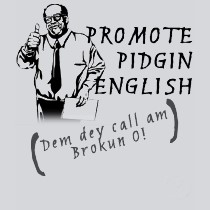
Pidgin is formally defined as “a simplified speech used for communication between people with different languages,” according to the Merriam-Webster dictionary. With more than 250 ethnic groups, Nigerian Pidgin English (also known as “Broken English”) is recognized as an informal means of communication and is widely spoken across the nation.
Pidgin English is not the official language in Nigeria, though some people would want it that way. One of the reasons why Pidgin is frowned upon is that opponents believe that prolonged use will color your English because it is considered an adulterated form of English. The same people would argue that speaking your native language fluently will color your English. I disagree on both counts. But I will leave that for another day.
Most Nigerians are familiar with basic terms and forms of usage. Examples of common terms are:
Wetin be dis? – What is this?
You dey craze – You are crazy
I no sabi im name – I don’t know his name
Dat pikin head resemble mango – That child’s head looks like a mango
More advanced terms are common with more advanced speakers. So, what does this have to do with fiction?
When people write stories, their characters are usually down-to-earth, true-to-type people. Everyday people, so to speak, and one way the “realness” of these characters shines forth is in their conversations.
Now, the fluency of the writer in speaking a language, generally, will shine throug these conversations. Generally. So in Nigerian fiction for example, apart from English, it is common to hear the characters speak Pidgin. It is a true reflection of the country’s use of language.
Some writers will provide translations directly or indirectly but some won’t even bother. The question then arises: How does a non-Nigerian or someone who doesn’t speak or understand Pidgin decode the message the writer is trying to communicate in that section that is written in Pidgin?
One trick I have observed is sometimes writers will allow another person respond in English to a question asked in Pidgin. That way you (the reader) can understand the Pidgin term. Some writers will put an asterisk or number at the end of the Pidgin word or term and then explain it further in the glossary or in a footnote at the bottom of that page. Some writers just don’t care and carry on as if every one was born with the ability to understand and decode all kinds of language.
Regardless of what method is used, I believe that communication is key. If the reader understands the meaning you’re trying to convey, then you have succeeded. If not, then those words are just like fancy pieces of art, which lack any intrinsic value.
It is also important to note that there are Nigerians who do not understand certain Pidgin terms. So, explaining or breaking it down is important, regardless of how you choose to do this.
I personally like Pidgin. It’s laid back, relaxed and sometimes is a better vehicle for communication than proper English. It’s good to have choices.
How else have you seen pidgin used in fiction? Do you like or dislike reading stories in pidgin?
Image Source


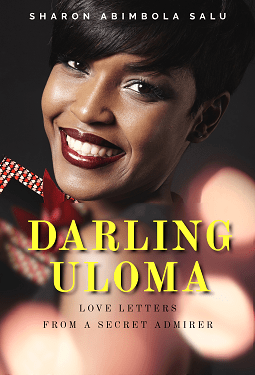
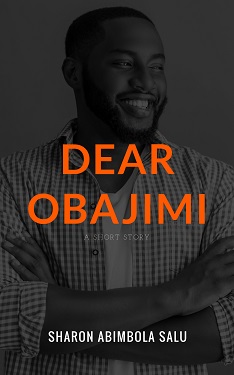
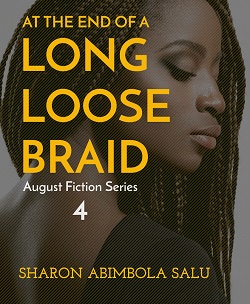
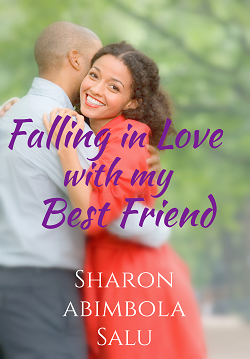

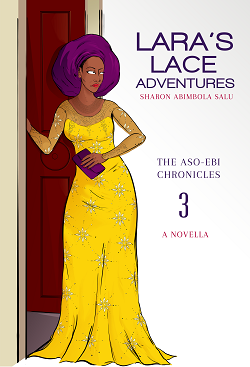
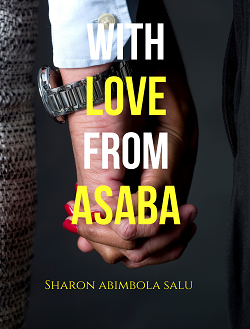
I wholeheartedly agree with you. An author who adds pidgin English or any other foreign language to a piece traditionally narrated in English should also provide his/her readers with the translation. Doing so creates an effective communication. For me, I absolutely love a mix in pidgin and English I wholeheartedly agree with I wholeheartedly agree with you. An author who adds pidgin English or any other foreign language to a piece traditionally narrated in English should also provide his/her readers with the translation. Doing so creates an effective communication. For me, I absolutely love a mix in pidgin and English I wholeheartedly agree with you.
Sorry for the mix up from my browser.
My comment again: I wholeheartedly agree with you. An author who adds pidgin English or any other foreign language to a piece traditionally narrated in English should also provide his/her readers with the translation. Doing so creates an effective communication. For me, I absolutely love a mix in pidgin and English itself.
Nice blog, Sharon.
Uzoma: No problem. I also prefer mixing English and pidgin. I suspect many others do too judging from the way Nigerians generally flow when speaking both.
Thanks for the compliments!
Uzoma: Thanks for taking time to leave a comment.
Hi Sharon,I’m studing English Studies and Im currently writing a paper on Nigerians attitude towards Nigerian Pidgin English.I compare Hausa and Pidgin English and I would like to talk to you.I would be very happy if I can write you on your email.I would like to find illustrations ,caroons in newspapers that illustrate the negative attitude towards pidgin english…eventhough it is an amazing language in its own right.Ill be very happy if you write me back asap.Vixi85@gmail.com.
best wishes
Dear Sharon,
good job! I’m studying African languages and now I’m doing my PhD about Nigerian Pidgin English, I also want to teach it so I m wondering can you recommend me some sources where I can find colours, body parts, animals, parts of house, family members names in Nigerian Pidgin English? (I’d appreciate if you contact with me by mail olgusf88@gmail.com)
Ola: Sorry, but Google is your best bet.